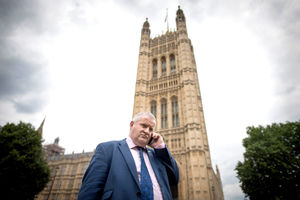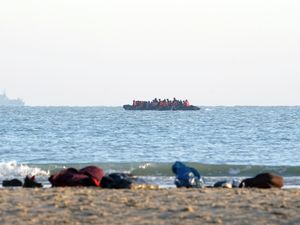Toby Neal: Sorry Ian, your sound and fury is just old hat
Toby Neal on a volcanic explosion with a disappointing anti-climax.

For the more combustible politicians, like the Scottish National Party's Ian Blackford, there is a problem, and that is that they have nowhere to go.
In the wake of Boris Johnson's reported comments that devolution has been a disaster, I was thoroughly looking forward to the response of Mr Blackford, the SNP's leader in Westminster.
Even in normal times, he is in a state of fulmination. He is like a particularly animated tub-thumping priest, angry, shocked, disgusted, warning, complaining, finger-wagging, self-righteous, lecturing, evangelical, never happy about anything, so I was expecting there to be nothing less than a nuclear detonation laying waste at least three rows of green benches.
But being in a state of permanent noisy over-revving, he had nowhere to go, no top gear, no peak to vault.
Yes, the tub was thumped and he was angry, shocked, disgusted etc. Yet his volcanic explosion was a disappointing anti-climax.
Turning to the substance of the matter, the question of whether devolution has been a disaster depends on how you want to look at it.
Clearly it has not been a disaster. Nobody has died. All that has happened is that certain powers have been devolved to Scotland, and so on. In terms of governance, it seems to work smoothly.
Clearly it has been a disaster. That is the case if the aim of giving Scotland devolved powers was to give the Scots a measure of self-rule which would make them content to remain part of the union with a degree of autonomy, and so defuse rising nationalist and separatist sentiments.
And that transparently was the aim.
Apropos of nothing, it was the devolution question which indirectly brought down James Callaghan's Labour government over 40 years ago, but I digress.
Instead of successfully fobbing off the Scots and making them think they were running their own country, devolution has empowered and energised nationalist sentiment, amid a keen awareness and resentment about the limits of the powers that people in London have deigned to allow them.
They have been given a taste of independence and, like Oliver, want more, the whole caboodle. It is a fact universally acknowledged in life that A leads to B.
The upshot is that there is a substantial body of MPs in the House of Commons who in effect consider themselves to be foreigners, or at least aspire to be foreigners, and do not see the interests of the UK aligning with their own Scottish interests.
They are in a position to vote on matters affecting the United Kingdom which, if they had their way, would not be a United Kingdom at all and would be broken up.
Their answer to virtually everything is for Scotland to become independent.
"The real disaster facing the people of Scotland is another 20 years of Westminster government," Blackford thundered.
"Isn't it clearer than ever that the only way to protect Scotland's interest, our Parliament and our place in Europe, is for Scotland to become an independent country."
Fact check. An independent Scotland would have to apply for membership of the EU, and to be accepted would have to meet the membership condition of having sustainable public finances. That might be tricky. Total borrowing is equivalent to £2,776 per person in Scotland, compared to £855 per person across the UK as a whole. (Source: Institute of Fiscal Studies)
At PMQs Sir Keir Starmer asked some half-hearted questions about BJ's "devolution disaster" comment. But the reality is that the pair of them do have some difficulty in speaking on Scottish matters as electorally they are emperors with no clothes.
The Tories and Labour have a meagre number of MPs north of the border.
Put another way, nobody is voting for them there.
Time to bring back silence
There was a series of BBC documentaries the other day about the fall of Berlin in 1945 which were ruined for me by distracting, moronic, and pointless "music" accompanying the contemporary footage.
It wasn't even music. It was drones, tones, groans, plinks and plonks. This sort of thing in factual programming has become a plague. Documentary producers see silence as a form of absence, a gap which must be filled – even in the most poignant and harrowing scenes where the pictures tell their own story. So viewers are given musical cues to guide them that "this is a sad bit" or "this is a happy bit" and so on.
Are none of them wise enough or brave enough to not realise that silence has a power all of its own?
Judicious use of music from sensitive composers and musicians really can add something, but that's not what's happening, perhaps because it would cost money.
My particular pet hate is what I would call the plinkerty-plink piano. Plinkerty-plink, plinkerty-plink, it goes in the background.
Techno geeks have been given a free run and their efforts are devaluing and at worst trivialising some of the most profound moments in history.
This desire to fill the "sound gap" is not just confined to television. Unnecessary sound is a great like-it-or-lump-it pollutant.
Maybe I'm at last being influenced by my late dad. All parents exist to be embarrassing to their children, and he could be very embarrassing.
If we went into a restaurant and there was music playing, he would ask them to turn it off. And it wasn't because he hated music – he was a concert standard pianist – but nobody had asked him if he wanted it, and he didn't.
All together now, shout out my new slogan. BRING BACK SILENCE!





